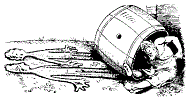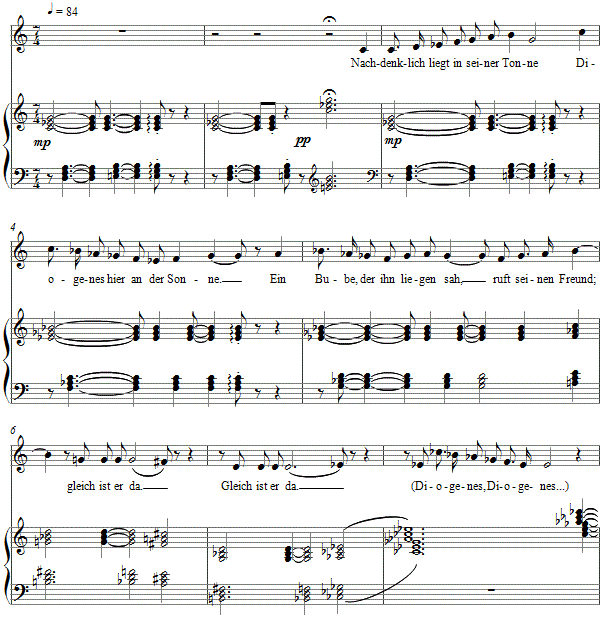Music and Texts of GARY BACHLUND
Vocal Music | Piano | Organ | Chamber Music | Orchestral | Articles and Commentary | Poems and Stories | Miscellany | FAQs
Jaja! Das kommt von das! - (2012)
Wilhelm Busch
for medium voice and piano
Nachdenklich liegt in seiner Tonne
Diogenes hier an der Sonne.
Ein Bube, der ihn liegen sah,
Ruft seinen Freund; gleich ist er da.
Nun fangen die zwei Tropfen
Am Fasse an zu klopfen.
Diogenes schaut aus dem Faß
Und spricht: "Ei, ei! Was soll denn das!"
Der Bube mit der Mütze
Holt seine Wasserspritze.
Er spritzt durchs Spundloch in das Faß
Diogenes wird pudelnaß.
Kaum legt Diogenes sich nieder,
So kommen die bösen Buben wieder.
Sie gehn ans Faß und schieben es;
"Halt, halt!" schreit da Diogenes.
Ganz schwindlig wird der Brave. -
Paßt auf! Jetzt kommt die Strafe.
Zwei Nägel, die am Fasse stecken,
Fassen die Buben bei den Röcken.
Die bösen Buben weinen
Und zappeln mit den Beinen.
Da hilft kein Weinen und kein Schrei'n,
Sie müssen unters Faß hinein.
Die bösen Buben von Korinth
Sind platt gewalzt, wie Kuchen sind.
Diogenes der Weise aber kroch ins Faß
Und sprach: "Jaja! Das kommt von das!"5 pages, circa 3' 40"
Die bösen Buben von Korinth / Sind platt gewalzt, wie Kuchen sind.
Diogenes and the bad boys of Corinth
a Grecian story
Pensively lying in his barrel,
Diogenes philosophized not on his peril.
A bad boy of Corinth by him had passed
Who called to his chum to join him fast.
On that barrel these bad boys drummed;
At civility they their noses thumbed.
Diogenes peered out from where he lay,
And said: Hey! That's not very agápē!
The hoodied boy, reports disclose,
Ran quick to fetch a water hose.
Sprayed through a hole knocked in a stave,
Diogenes was drenched by this one knave.
Barely could Diogenes lie down again,
These two bad boys returned, and then...
The two began to push and spin
The barrel; Diogenes screamed within.
The barrel heavily turned and spun,
And to the boys it seemed fine fun.
Two nails sticking out here and there
Caught on their jackets. Ah, beware!
The boys were taught by physics' law,
As they screamed and flipped and saw...
The barrel rolling, flattening them,
Not ever part of their stratagem.
Those boys from Corinth, bad, unwashed,
Were predictably and fully squashed.
Philosophizing, Diogenes was not perplexed.
"Ah yes, one thing regularly leads to the next."
rhymed paraphrase by the composer
Copyright 2012 © Gary Bachlund All international rights reserved.
In 1845 the painter Caspar Braun and bookseller Friedrich Schneider formed a publishing entity, "Braun und Schneider", among their satirical works was "Die fliegenden Blätter." Three years later they introduced their "Münchener Bilderbogen", which eventually came to number about 1200 works in rhyme and pictures. Wilhelm Busch contributed about fifty of his own rhymes and cartoons, from which the above is taken. This story in rhyme and pictures for each couplet stems from 1863. I take it as metaphor for today, as I muse over the Greek politicians who caused their nation to fall so deep in debt as to bring the nation into insolvency. As Busch reminds through the fictional statement of his Diogenes, "Ah yes, one thing regularly leads to the next." Ever increasing borrowing in the modern Greek tale -- ah yes -- leads to its inevitable outcome. There are nails which have caught the "bad boys of Corinth" in so many nations, yet again.
The setting moves quickly through tonal regions, and for this no key signature is used. Begun in a bi-tonal harmonic coloring centering on C, it ends in quite another place -- G flat -- after rather distant wanderings. Some small "curtains" interrupt the text with repetitions of the name, Diogenes, and the last phrase and lesson is twice repeated.
The score is available as a free PDF download, though any major commercial performance or recording of the work is prohibited without prior arrangement with the composer. Click on the graphic below for this piano-vocal score.

